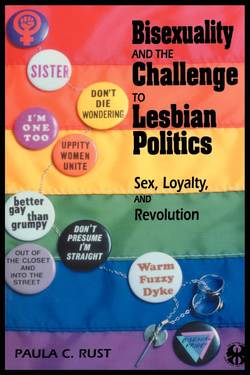Читать книгу Bisexuality and the Challenge to Lesbian Politics - Paula C Rust - Страница 23
На сайте Литреса книга снята с продажи.
4 LESBIANS’ VOICES: WHAT DO LESBIANS THINK ABOUT BISEXUALITY AND ITS ROLE IN SEXUAL POLITICS?
ОглавлениеA few of the women who participated in this study might have, on occasion, written a letter to Out/Look or an article for a regional lesbian newsletter, but most have not. The women who participated in this study are the women who read these letters and articles and respond to them privately. If they care about the issues raised, they might discuss them with personal friends; if they do not care, they might never finish reading the article. Whatever their thoughts and opinions, they do not appear in print and do not become a matter of public record. Yet, these are the thoughts and opinions of the lesbian community. Does this silent majority share the opinions expressed by the women whose voices appear in print? Do they consider the issues debated in the lesbian press to be important enough to have an opinion about? How do lesbians really feel about bisexuality, bisexual women, and social and political relations between lesbians and bisexual women? How do their feelings about bisexuality reflect their thoughts and feelings about who they are and what they stand for as lesbians?
Participants in this study answered several questions about their attitudes toward sexuality, bisexuality, and bisexual women. The most important question was a very simple open-ended one, “What is your opinion of bisexuality?” Although this question would seem to be a straightforward request for an opinion, the answers women gave revealed much more than that. The value of this question lies in the fact that it allowed women to define the issue of bisexuality themselves, in their own words, and then to respond to the issue as they saw it. Every lesbian respondent read the same question, but each transformed this question into her own before giving an answer. These answers therefore reveal what the issues are as well as how lesbians feel about them.
One of the most controversial issues is the question of whether bisexuality exists at all. This question was raised either explicitly or implicitly by more than half of the lesbians in the study, and the answers given covered the entire gamut from “it does not exist” to “everyone is inherently bisexual.” Nearly as important is the issue of defining bisexuality; if bisexuality exists, what is it? Those lesbians who agree with each other that bisexuality exists disagree over what it is that they are talking about. Not only do lesbians have a variety of definitions of bisexuality, but these definitions of bisexuality reveal fundamental differences in the way lesbians think about sexuality in general and about the philosophical and political relationships between lesbianism and bisexuality.
Once the questions of existence and definition are answered, the question “What are bisexuals like?” arises. Lesbians hold a variety of beliefs about bisexual women, particularly about bisexuals’ personal characteristics, sexual proclivities, and political allegiances. A few respondents not only described bisexual women, but compared lesbian and bisexual lifestyles in terms of their social and political implications or consequences. Finally, most respondents did answer the question that was asked, “What is your opinion of bisexuality?” by describing their own personal feelings about bisexuality and bisexual women.
In this chapter, I describe the variety in lesbians’ images of and feelings about bisexual women; then, in chapters 5 and 6 I will analyze the individual and historical bases of these attitudes.
